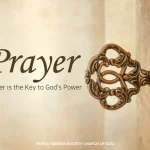IN THE DAYS OF HIS POWER SERIES.
TOPIC: I WILL HAVE MERCY ON WHOM I WILL HAVE MERCY -GOD
COMPILED/EDITED BY-:
Rev. Innocent Chukwudi Peace-Udochukwu President Living Fountain Ministries Int’l LIFOM
“I will be gracious upon whom I will be gracious, and will show mercy upon whom I will show mercy.”
—Exodus 33:19
Because God is the maker, and creator, and sustainer of all things, he has a right to do as he wills with all his works. “Shall the thing formed say to him that formed it, Why hast thou made me thus? Hath not the potter power over the clay of the same lump to make one vessel unto honor, and another unto dishonor?” God’s absolute supremacy and unlimited sovereignty naturally flow from his omnipotence, and if it were not so, the superlative excellence of the divine character would entitle him to absolute dominion. He should be chief who is best. He who cannot err, being perfect in wisdom; he who will not err, being as perfect in holiness; he who can do no wrong, being supremely just; he who must act in accordance with the principles of kindness, seeing he is essentially love, is the most fitting person to rule.
We live in the age where the center of the universe is man. We live in an age where the center of gravity is me, myself and I. But here, we are going to consider not man’s idea about himself, but this is about God revealing Himself.
“What shall we say then? Is there unrighteousness with God? God forbid”
“For he saith to Moses, I will have mercy on whom I will have mercy, and I will have compassion on whom I will have compassion”
“So then it is not of him that willeth, nor of him that runneth, but of God that sheweth mercy”
“For the scripture saith unto Pharaoh, Even for this same purpose have I raised thee up, that I might shew my power in thee, and that my name might be declared throughout all the earth.”
“Therefore hath he mercy on whom he will have mercy, and whom he will he hardeneth”
Romans 9:14-18
Tough words, if you really sit down and think about it, because it challenges the paradigms, challenges the concepts we already have as men. But this is the time for us not to indulge in human rationalization, but a time for us to humbly plead for God’s revelation to be understood in our lives.
The Bible reveals to us that our God is a God of salvation. Indeed, that has been the theme of Romans, that God is the God of salvation, salvation belongs unto the Lord. He gives salvation in His Son Jesus Christ. He that has the Son has life and he that has not the Son of God has not life.
So if you believe in Jesus, you are saved. If you do not believe in Jesus, you will not be saved. Salvation is only found in Jesus Christ His Son. And therefore, not all of the nation of Israel is saved. Some are saved, but others are not. And that is the point Paul was making in Romans 9:6 ‘For they are not all Israel, which are of Israel.’
This is the point: salvation is selective, salvation is elective, it is not universal. You say, “Pastor, are you sure?” Yes, look at the life of Abraham and that’s what Paul went on to explain. God said to Abraham, “I will give you a child and from your seed, all nations will be blessed.” So, Abraham waited and waited and waited and waited but there is no movement in the tummy of Sarah. And so one day, Sarah and Abraham hatched a deceitful plan. They wanted to help God, they say, “God, I don’t think you can give me a son, so maybe I should do something about it now” and so they found themselves Hagar the handmaid, the Egyptian woman, and they said to each other, “Abraham, I know this is very painful for me, but you go, because we got to help God here, otherwise we will not have a son.” And that’s what they foolishly did. Abraham went into Hagar the handmaid and as a result, Hagar gave birth to Ishmael and Abraham was convinced that Ishmael would be the one God will use to bless the nations. This would be the child of promise. But you know what God said? “No, it will not be Ishmael, I am not accepting Ishmael. He is not the one. Sarah, you will have a child. I know you’re 90 years old, I know your factory is closed, humanly speaking, I know you have died to that hope that you would ever have a child, but let me tell you, this is the child of promise, I will do it” and God did it.
Isaac was born of Sarah and God said, “It will be Isaac.” God said it would be Isaac even before Isaac existed. Even before Sarah was pregnant, God said, “It will be this child and you call him Isaac. Ishmael I have rejected.”
Now, some of you may say then, ‘This is not fair, of course this doesn’t work, because Hagar is an Egyptian, Sarah is a Jew, of course God would reject that which is from Hagar.’ But to prove the point again, Paul goes to the second example and that is from Isaac himself. Isaac had a wife, just one- Rebekah, and Rebekah gave birth to twins. Now, this time you can’t argue that it is a different mother- same mother, same womb, about the same time. Esau came out fractionally earlier, followed by Jacob. If it is left to human choice, generally, Esau will be the one who would be chosen; he’s the firstborn.
In that culture, he has a right to double privilege. But you see, this is not man’s choice, it’s God’s choice. And God said, “Jacob have I loved, Esau have I hated.” “I choose Jacob before he is born, I reject Esau before he is born.” Salvation is selective, better put, elective, even before they are born.
This is uncomfortable to us, because we think in our human minds, ‘This is so unfair! God, this doesn’t quite match up to my idea of who You are! You should have chosen all, and given the choice to them.’ But friends, I’m not here to tell you what man wants to think. If you are uncomfortable with it, let me tell you, first of all, this is a fact, “As it is written,” “I have chosen Jacob, I have not chosen Esau. I have chosen Isaac, I have not chosen Ishmael.”
What shall we say then? Is there unrighteousness with God? You see, this is a very valid question, because verse 13 and the preceding verse is saying, God is selective, God is elective in salvation. Therefore, to us as men, we feel uncomfortable. It seems that God is unfair, unjust, unrighteous and therefore Paul, preempting this question says, “This is what I want to answer for you.”
God is utterly free from the constraints of his creation. The inclinations of his will move in directions that he alone determines. Whatever influences appear to change his will are influences, which ultimately he has ordained. His choice to show mercy to one person and not to another is a choice that originates in the mystery of his sovereign will not in the will of his creature. And Exodus 33:18–19 teaches us that this self-determining freedom of God is his name and his glory. If God ever surrendered the sovereignty of his freedom in dispensing his mercy, he would cease to be all-glorious, he would no longer be Yahweh, the God of the Bible.
We’ve stated the doctrine of this text with these words: It is the glory of God to be gracious to whomever he pleases apart from any constraint originating outside his own will. Or God’s sovereign freedom is essential to his name. When this doctrine is applied to the salvation of individuals, it is called unconditional election. Election refers to the choice God makes of whom he will save, and unconditional refers to the fact that his choice is not based on any condition or qualification that individuals have. It comes from the mystery of God’s sovereign will.
What shall we say then? Is there injustice on God’s part? By no means! For he says to Moses, “I will have mercy on whom I have mercy, and I will have compassion on whom I have compassion.” So it depends not upon man’s will or exertion, but upon God who has mercy. For the scripture says to Pharaoh, “I have raised you up for this very purpose of showing my power in you, so that my name may be proclaimed in all the earth.” So then he has mercy upon whomever he wills, and he hardens whomever he wills.
In other words, it is not the belief of the people that determined whether God would ordain them to eternal life. Just the opposite: the prior ordination of God determined who would believe. Faith is a gift of God’s grace and saving grace is given to whomever God wills — unconditionally.
This is very similar. In Acts 13:48, we learned why some people do believe. In John 10:26, Jesus tells us why some people don’t believe. He says, “You do not believe because you do not belong to my sheep.” In other words, your believing does not make you a sheep. Being a sheep enables you to believe. You do not make yourself into a child of God by your own initiative to believe. God makes you into a child of God so that you have a nature that can believe (John 1:13). He is gracious to whom he will be gracious.
“God chose us in Christ before the foundation of the world, that we should be holy and blameless before him. He predestined us in love to be his sons through Jesus Christ, according to the purpose of his will to the praise of his glorious grace”
(Ephesians 1:4–5).
God preserves his freedom in the dispensing of his grace so that when we boast, we will boast in the Lord and not in ourselves. All his choices are for the sake of the praise of the glory of his grace.
If the glory and the name of God is his sovereign freedom, how then should we think about our believing and our obedience? Peter gives us the answer. He says, “Therefore, brethren, be the more zealous to confirm your call and election, for if you do this you will never fall.” In other words, our zeal of faith and obedience does not make us elect. It confirms that we are elect. Faith and obedience are a gift, and the possession of the gift is a confirmation of the favor of the Giver. God is not moved to choose us because of our faith. We are moved to have faith because God has chosen us. He is gracious to whom he will be gracious.
This is what the doctrine supplied to Moses. Moses needed hope that God really could have mercy on a stiff-necked people who had just committed idolatry and scorned the God who brought them out of Egypt. To give Moses the hope and confidence he needed God said,
“I will be gracious to whom I will be gracious.”
In other words, since my choices do not depend on the degree of evil or good in man but solely upon my sovereign will, no one can say he is too evil to be shown grace. The doctrine of unconditional election is the great doctrine of hope for the worst of sinners. It means that when it comes to being a candidate for grace, your background has nothing to do with God’s choice.
If there is anyone here today who has not been born again and brought to saving faith in Jesus Christ, do not sink into hopelessness thinking that the excessive rottenness or hardness of your past life is an insurmountable obstacle to God’s gracious work in your life. God loves to magnify the freedom of his grace by saving the worst of sinners.
Turn from your sin; call upon the Lord. Even in this message he is being gracious to you and giving you strong encouragement to come to him for mercy. The doctrine of unconditional election means hope for the worst of sinners. “Come, let us reason together, says the Lord: though your sins are like scarlet, they shall be as white as snow; though they are red like crimson, they shall become like wool”
(Isaiah 1:18).
At this moment God will cause his truth to attract your hearts to Jesus, or to affright you to him. May you be drawn as the bird is drawn by the lure, or may you be driven as a dove is hunted by the hawk into the clefts of the rock. Only may you be sweetly compelled to come. May my Lord fulfill this desire of my heart. O that God may grant me your souls for my hire; and to him shall be the glory, world without end. Amen.
SHALOM
FOR MORE SPIRITUAL INSIGHT/PRAYER REQUESTS 🙏 PLEASE CONTACT US AT RHEMA PRODUCTIONS TV ABUJA, NIGERIA.
PHONE: +2348033083732
EMAIL: revinnopeace@gmail.com
WEBSITES: www.rhemaproductionstv.com, www.rptvblog.com















More Stories
The Power of a Mind Illuminated by the Light and Word of Christ
Cutting Off the Horns of the Wicked: A Biblical Exploration of Psalm 75:10
Refined with Afflictions in God’s Refinery